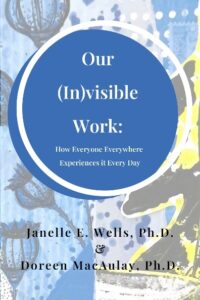Our (In)visible Work: How Everyone Everywhere Experiences It Every Day by Janelle E. Wells, Ph.D. and Doreen Macaulay, Ph.D. (Book Excerpt)
 Invisible Work Lives in Your Roles
Invisible Work Lives in Your Roles
The roles we play in society often come with unspoken expectations. As two married cisgender females working full time as professors and part-time as consultants all while raising children and assisting aging parents, there are a significant amount of the discussions centered around identities and gender issues. And while we know that globally women, compared to men, do three times the amount of unpaid care work at home, on top of the childcare and housework,11 this book is not solely focused on gender. Everyone has invisible work. In the transformative state that our society is experiencing, we all must be part of the conversation to realign the workplace to be a place where people’s talents or their time are not taken advantage of because of a part of their identity. In addition to our identities, some of the most profound roles often carry the weight of invisible work — those quiet, unsung tasks that go beyond the surface and shape the very essence of our existence. For example:
The token individual: The invisible work of the token individual in the workplace is a subtle but a weighty burden to bear. Beyond the visible tasks and responsibilities, this individual often shoulders the unspoken societal expectation to represent an entire demographic. It is the quiet effort to navigate biases, dispel stereotypes, and pave the way for others who may follow. It involves the emotional labor of constantly managing expectations, educating colleagues, and advocating for oneself and others. The token individual often finds themself in the role of an ambassador for diversity and inclusion, serving as a living example of what is possible, all while managing their regular workload.
The stay-at-home parent: The invisible work of a stay-at-home parent is a symphony of love and dedication, orchestrated behind the scenes of daily life. It extends far beyond visible tasks. It’s the emotional labor of constantly answering the question, what do you do all day? It’s the management of schedules, doctor’s appointments, and playdates, often executed with meticulous precision. It’s the juggling act of maintaining a harmonious household, keeping the family’s needs met, and providing a nurturing environment where love and learning thrive. This invisible work is a labor of profound significance, shaping not only the lives of children but also the bonds that tie a family together, and it deserves the recognition and appreciation it often humbly foregoes.
The cultural translator: The invisible work of being the person others look to educate, translate, connect, and enhance communications between different cultures. You may not be the lone individual of a group. You may not even be part of the group you are translating for, however, through your experience, language abilities, cultural knowledge, or empathetic nature you are expected to be a communication conduit continuing to make things hum in the office.
From these examples we see the potential layers of invisible work that people are experiencing. Adhering to the idea that once you have seen something you cannot unsee it, one would believe that acknowledgement of the unseen work would be enough to initiate change. The norms and expectations of roles, however, are steeped in culture, religion, and a strong history and make the want for change insufficient. There needs to be more deliberate and intentional action.
Invisible Work: A Loose Thread
Think of our invisible work, as a loose thread — an unraveled strand of our carefully woven existence. Like a single loose thread, it may seem insignificant at first, easily dismissed or overlooked. However, if left unattended, it has the potential to unravel the entire fabric of our lives. Considering invisible work as the loose thread requires acknowledging the impact of invisible work on people that are expected to live up to certain role expectations. Increased rates of burnout and unhappiness suggest we need to consider the loose thread. As we confront the concept of invisible work, we have several choices in how we want to deal with the loose thread. Leaning into the thread metaphor — how have you dealt with a loose thread on a piece of clothing? Did you:
Let it be and fray further — risking the unraveling of what we hold dear.
Tug at it — seeking to repair.
Cut it off — putting an end to it.
Option one: Let it be. Continue the frustration of invisible work. We may choose to ignore the loose thread, hoping it will not be noticed or eventually fade into obscurity. This path can offer temporary relief, allowing us to avoid discomfort or confrontation. However, it carries the risk of the loose thread growing longer and more troublesome over time.
What initially seemed inconsequential might become a source of frustration, regret, resentment, or missed opportunity.
For book info., visit https://wellsquest.com/ourinvisiblework/
- Seedat, , & Rondon, M. (2021). Women’s wellbeing and the burden of unpaid work. BMJ, 374.
 Dr. Janelle Wells
Dr. Janelle Wells
Love, learn, lead, and lift are hallmarks of Dr. Janelle E. Wells’ life work. Her lived experiences stimulated her research in organizational behavior, specifically leadership, career development, and gender equity, published in the Journal of Business and Psychology, Journal of Sport Management, and the Leadership & Organizational Development Journal. She is a monthly contributor to Psychology Today. In 2019, she co-edited her first book The Business of Esports: The Wild Wild West on Fire and in 2024, co-authored Our (In)visible Work. Dr. Wells is the Co-Founder of WellsQuest, a platform where she develops personal and professional growth initiatives. She is deeply committed to serving her community and empowering women. She is an Associate Professor at the University of South Florida, serves as an advisory board member of the YMCA, is a founding board member of Women in Sports and Events Tampa Bay and a founding research fellow for Wasserman’s The Collective Think Tank. Her most meaningful purpose is raising three active young boys with her husband.
 Dr. Doreen MacAulay
Dr. Doreen MacAulay
Doreen MacAulay is a facilitator, author, and university instructor with 20+ years of experience in organizational and personal development. Dr. MacAulay is passionate about creating equity in the workplace, and helping people develop their authentic and practical selves. She is an award-winning professor at the Muma College of Business, University of South Florida, where she teaches leadership, organizational behavior, and management. She has worked with Fortune 100 and 500 corporations, non-profit organizations, and academic institutions. Dr. MacAulay is a monthly contributor for Psychology Today and co-authored the book, Our (In)visible Work. She holds a Ph.D. in Management from St. Mary’s University in Nova Scotia, Canada. She has lectured at academic institutions worldwide. Her love for travel and culture is even more meaningful when shared with loved ones, particularly her daughter and husband.
